"We hope Colombia takes extradition requests seriously," says John McNamara, head of the U.S. diplomatic mission in Colombia.

For the Donald Trump administration, Colombia remains a key ally in the hemisphere. But actions and statements by the Colombian government, starting with those of President Gustavo Petro, are generating growing concern in Washington for the first time in decades and that could have consequences for the bilateral relationship.
That's the message being bluntly sent by John McNamara , head of the United States diplomatic mission in the country. McNamara, who before becoming a diplomat also served as a military officer for his country in law-enforcement areas like Arauca and the southeastern jungles, makes it clear that Washington is not comfortable with the Petro government's decisions to halt the extradition of drug lords amid "total peace." He warns that Washington respects Colombia's decisions regarding the controversial gang subjugation law recently introduced by the executive branch, but is attentive to how and by whom those decisions are made.
Mr. McNamara, how do you assess the House Appropriations Committee's decision, which could reduce U.S. aid to Colombia, and the most recent statements by members of the Colombian government about drug use in their country? 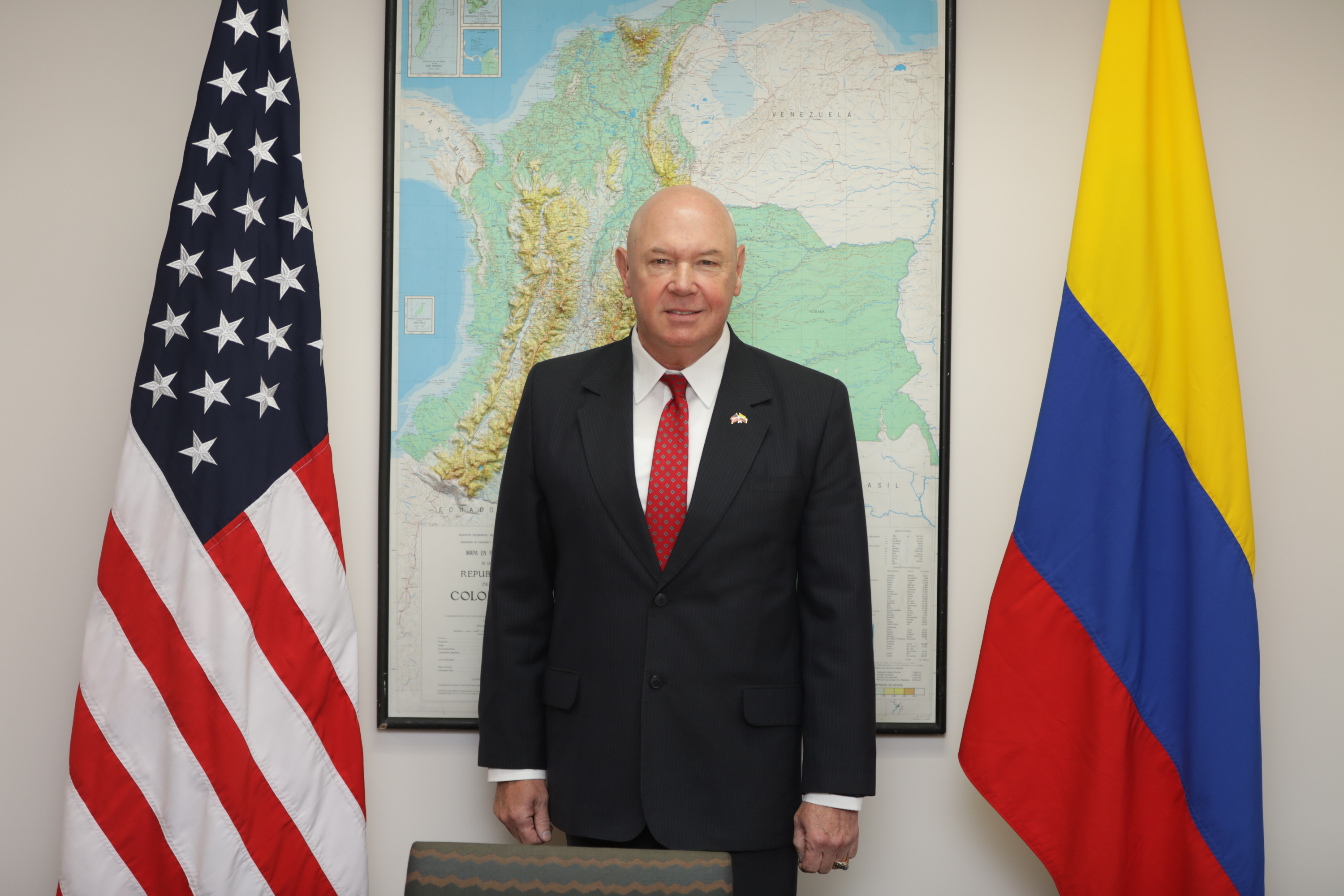
John McNamara is Chargé d'Affaires at the U.S. Embassy in Bogotá. Photo: MAURICIO MORENO
We refrain from commenting on legislative proposals that have not yet been finalized by the United States Congress. However, we find the public rhetoric of some members of the Colombian government deeply concerning and discouraging. The bilateral relationship is like an airplane, and we find ourselves in a turbulent time . Our two governments, as co-pilots, must work together to find clear skies and more favorable conditions for the benefit of both our nations.
By the way, a couple of weeks ago you returned to the country after a tense situation between the two governments, and you said that the Trump administration remained concerned about statements made by high-ranking Colombian officials. How are those concerns progressing? Rather than concerns, I'd like to share our perspective on the bilateral relationship. It's an honor for me to serve as the U.S. representative in Colombia. This has been a very special country to me and is very close to my heart. I've had the privilege of serving in Colombia, both in uniform during the conflict and in various diplomatic roles, over many years. I've witnessed firsthand the courage and bravery of the Colombian people: I went to Boyacá Avenue a week ago for the July 20th military parade, and I was struck by the fact that when the soldiers and police officers wounded in combat passed by, everyone nearby, including me, came forward to applaud and thank them. They are an example of the sacrifice of the people fighting to defend democracy, which is an integral part of Colombia. The comprehensive relationship between the United States and Colombia is long-standing and solid, spanning more than 200 years. Our institutions maintain strong ties that transcend the political administrations of both countries, the things that come and go in the political life of a country. Fundamentally, the relationship is strong and enduring, and one to which we have a deep commitment as the American people. But it should be noted that we are seeing a sometimes negative trend that puts our historic, close, and mutually beneficial relationship at risk. Indeed, I returned after being recalled for consultations by Secretary of State Rubio, and it's clear that the unconstructive rhetoric and actions from the highest levels of the Colombian government continue to be a growing concern. But my Embassy team and I seek to discuss these issues with the Colombian government and convey the concrete steps the Trump administration has outlined to get our relationship back on track. I believe that for any problem, there is always a solution, and that is our approach in everything we do with the Colombian government and people. But as you who have been to Cali, and I, being a salsa fan and sincere, know, you can't dance alone. We count on the collaboration of our partners here in Colombia, from the Petro government, to get through this time of ups and downs. We hope to overcome this and remain close partners, with shared democratic values and, as they say in Colombia, like the partners we have always been. We want to continue standing shoulder to shoulder with the worthy Colombian people and with the governments of any era, who are elected and represent this great country.
There are moments that test this historic relationship, such as the certification of the anti-drug war. What is your perspective on what could happen, given Colombia's successes in drug seizures, which contrast with the record highs in coca cultivation and potential cocaine production? 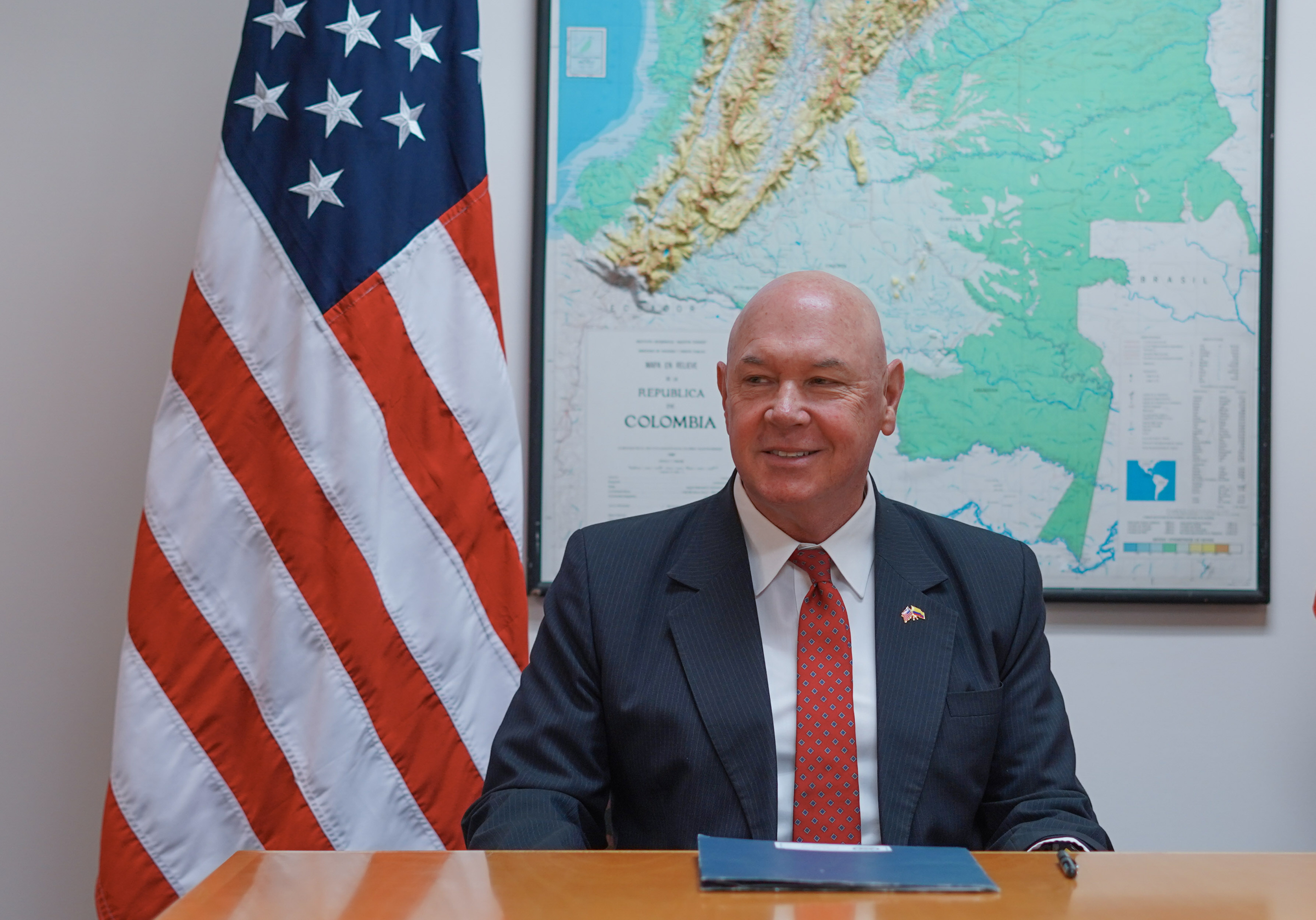
John McNamara was summoned for consultations a few weeks ago by Secretary of State Marco Rubio. Photo: MAURICIO MORENO
We must remember the alliance against that common enemy, drug trafficking, in which we have worked and sacrificed for decades together for the well-being of the Colombian people and our people. Where there is drug trafficking, there is corruption, violence, and environmental damage. We have much in common with this government, and with previous governments, because this poison is harming the youth of both countries and creating great challenges for public order. On that basis, this issue of certification has much to do with bilateral collaboration, and it should be noted that the Petro government and the glorious Colombian Armed Forces and their cousins in the Police are involved in the fight. In recent years, the Colombian government, in collaboration with us, because we have a very close relationship, has had great achievements in terms of cocaine seizures: tons and tons, as President Petro said in his speech on Sunday. It must be acknowledged that when there is more cocaine, it's logical that the probability of seizures is higher, but this in no way affects Colombia's courage and commitment to combating this common enemy. Regarding the extraditions of drug lords and traffickers, Colombia has been a good partner of ours for many years, including during this administration. Last year, 169 criminals were sent to the United States: that's a large number, and this year we continue with high figures. This is another example of collaboration. But it must be said that every rose has its thorns, and the thorn for us is that while we recognize the unparalleled bilateral relationship in criminal justice, which resulted in this large number of extradited drug traffickers, we are concerned about the growing list of exemptions or suspensions (of wanted drug traffickers) in 2025 for their involvement in the peace process. We support Colombia's peace efforts; we have always been partners in that. When I was a political advisor, I was part of the team that supported the negotiations with the FARC that resulted in President Santos's great achievement. But in our desire to achieve peace, we must be aware that what is wrong is wrong. If someone continues their illicit work while talking about peace, well, that worries us. I'm sure that by talking with the Colombian government, we can resolve this problem of a few, but representative, cases of suspension of extraditions.
The bilateral relationship is like an airplane, and we find ourselves in a turbulent time. Our two governments, as co-pilots, must work together to find clear skies and more favorable conditions.
A major concern is the alarming growth of coca crops in Colombia. Today, there are more than 250,000 hectares. We understand the affection the President and his government feel for farmers: they are fair, hard-working people, part of the fabric of Colombia. But as long as coca crops are growing, the evils of corruption and illegal armed groups will continue to pose a danger to the well-being and security of the Colombian state. The government has a goal of eradicating 30,000 hectares this year. It's three times more than last year, a remarkable goal. But we're already at the end of July, and I understand that the eradication rate is slow : 15 percent of the target. The second half of the year must be full steam ahead if the government wants to meet that goal.
In Colombia, there is a heated controversy over the government's plan to give benefits to drug lords amid "total peace." What is the United States' position? 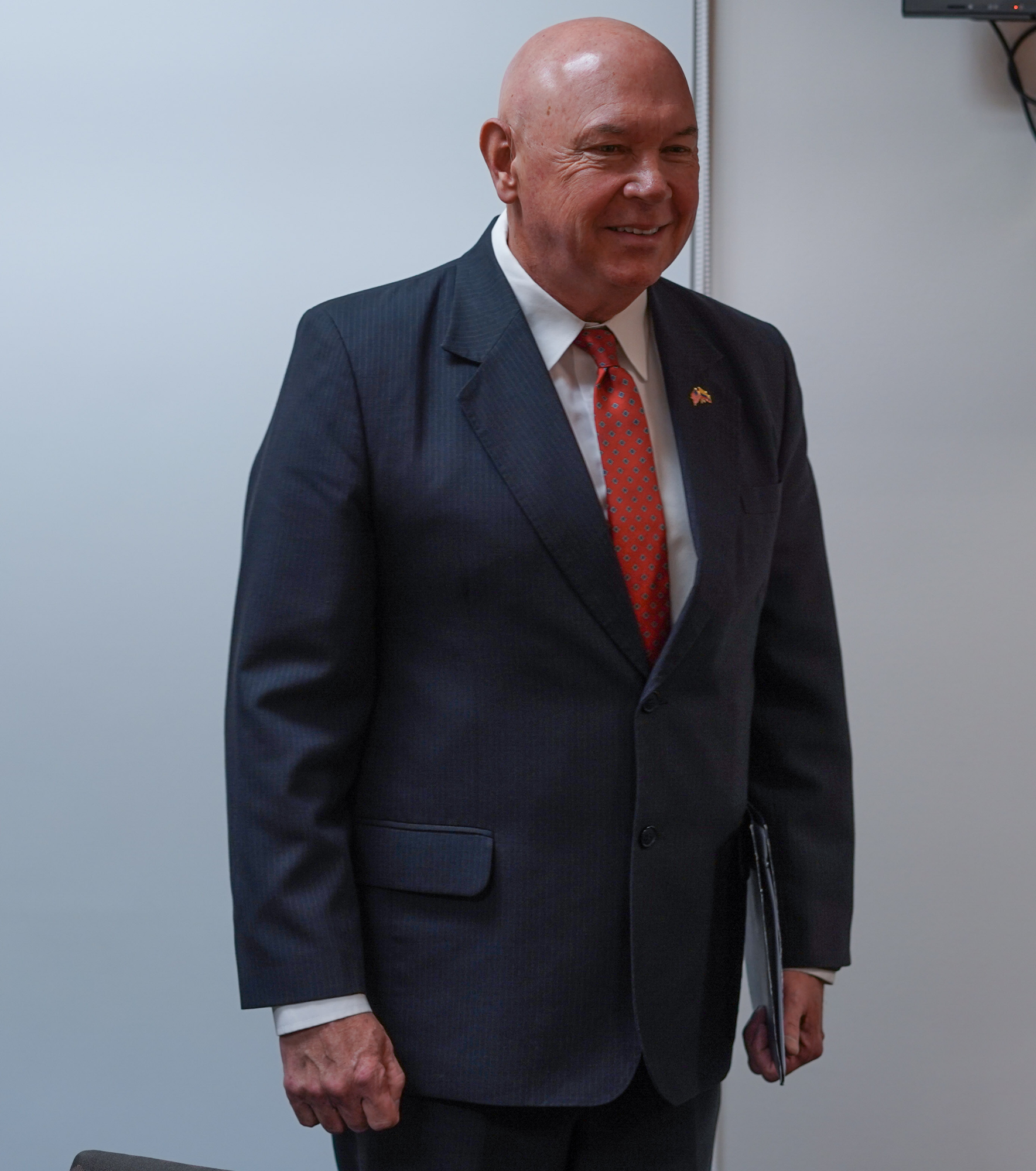
McNamara highlighted the trade relationship between Washington and Bogotá. Photo: Mauricio Moreno
The United States supports peace and stability in Colombia and justice for the many victims. But establishing a real and lasting peace remains elusive. While there has been progress in some areas, the stalemate in key implementation of the agreements threatens to stifle what has been achieved to date and, in the long term, the sustainable peace that all Colombians deserve. The escalating violence by illegal armed groups is of deep concern to the United States, especially when that violence coincides with Colombia's electoral cycle. There are security problems in various parts of the country, such as Catatumbo, Valle, Buenaventura, and Chocó, and guerrilla strikes that affect the people. I believe that as diplomats, we must know how far to go and how to provide public input on the internal affairs of any government and any country. Respect for sovereignty is essential in a relationship like ours. Therefore, in terms of processes, laws, and negotiations, I'm going to step aside: it's not my place to speak publicly about this, while we have an open channel that we use daily with the government and other authorities on issues of mutual interest. I believe it's a decision that corresponds to the Colombian people and their representatives, according to the Constitution and Colombian norms.
Given this position, would it be acceptable for your country for a major drug lord like alias Chiquito Malo, head of the "Gulf Clan," to spend only five years in prison in special facilities and also be able to keep 12 percent of his illegal wealth, as the bill proposes? I believe we should think about the victims of any crime: of violence, of extortion, of the "miraculous catches" we experienced in previous times. Those were very difficult years. Each country decides its own justice system; that's its right. The 2016 peace process created a new system, transitional justice. But in terms of extradition, we asked for, and have had, a lot of collaboration over the decades from the Colombian governments: if (these people) are guilty enough for us to request extradition, which is a costly and time-consuming process, we ask that they take it seriously, as they have, and that they continue to collaborate with us. Those who benefit from these extraditions of the worst of the bad guys are the Colombian people, their children, and their future, because every action we take as adults serves as an example for young people. But we leave this in the hands of the Colombian people, and obviously we are in talks with the government.
As a military officer, you were in the country during very difficult times during the conflict. How do you view the situation, the "total peace"? The Colombian authorities know that there is a worrying wave of violence in some regions, such as Cauca, Valle del Cauca, and Catatumbo. I have traveled throughout the country, not only as a diplomat. I know that local and national authorities are taking what is happening seriously. I remember what happens when control is lost—I'm not saying that's happening now—but I remember when I was in Arauca and Saravena, for example. There was a great influence of the FARC and ELN in one part of the country; the State had control over the cities and mobility corridors, and there were areas with significant paramilitary influence. We must avoid that. We remember the difficult and dark times, when Colombia lost three presidential candidates, and we see the sad tragedy of what happened to Senator Miguel Uribe. It's worrying. I believe the Colombian people don't want a step backward in terms of security, and I believe the government is aware of that, and that the Public Forces are dedicated to their work, as always . The Colombian people deserve peace: The United States has no formal role in the Colombian government's talks, but as our representative stated on July 18 at the United Nations Security Council, we are concerned about some of the Colombian government's decisions and are assessing the progress and lack thereof. Colombia is a country with complete sovereignty, a very close partner with whom we have sacrificed blood and lives in defense of democracy, as happened in the Korean War with the Colombia Battalion. Peace is good: at what cost? It depends on each country, each society, each government.
Colombian business leaders have sought out rapprochement with their government regarding a worrisome issue: tariffs on our exports. How is that process progressing? 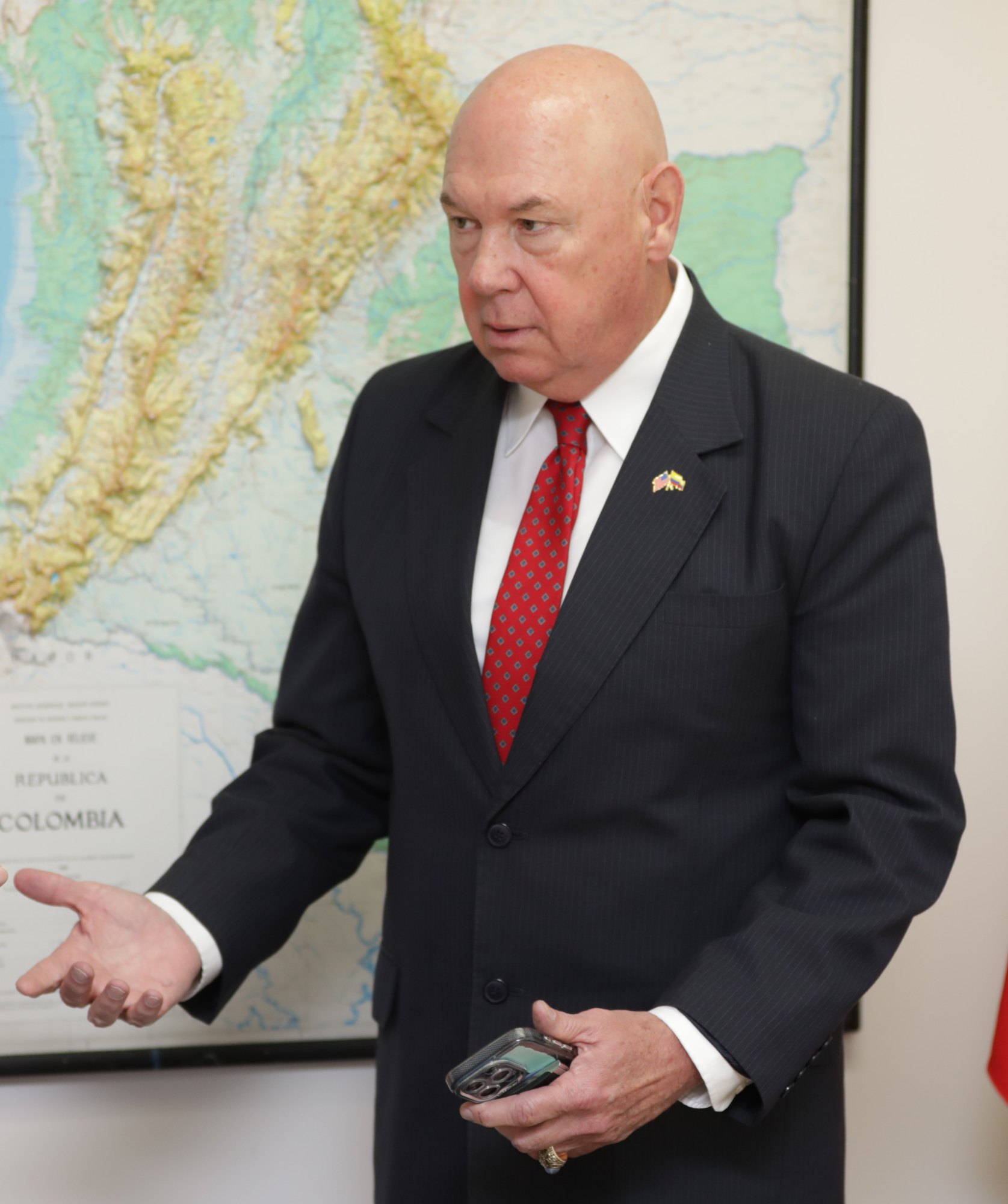
The relationship between Colombia and the United States has seen several tense moments in 2025. Photo: MAURICIO MORENO
We are proud to have such a close relationship with the Colombian private sector. We maintain communication through AmCham and Andi; we understand the concern and desire to maintain this historic relationship. The United States is proud to be Colombia's largest trading partner . Trade between our two countries has a value-added component, and this is not the case with all of your economic partners. Thanks to the FTA, which has been in place for more than 10 years, bilateral trade and investment have expanded significantly, with nearly $55 billion in trade, goods, and services in 2024. In 2024, more than a million of my compatriots visited Colombia. The United States was the main source of tourists who, regardless of the distance, want to see your beautiful country. But we have underscored the importance of Colombia addressing several unfair business practices, particularly in the automotive and agricultural sectors. We call on Colombia to respond pragmatically to address these issues with the representative of the Trade Office. When it comes to tariffs, some non-tariff barriers to iconic U.S. products persist in Colombia. President Trump has been clear: if our trading partners align themselves with our efforts to achieve fairness and balance in our trade relations and help us protect our economy and national security, we are prepared to welcome any proposal with an action plan to address the risks in our trade relations.
Does that mean you haven't received a proposal from Colombia on this matter? I'm not saying that. I'd return to my point: we have diplomatic channels, an open channel with a broad flow of information, negotiations on many issues. But that's something reserved. We agreed between the governments that we will only publish any news until everything is ready and a reality. But we welcome any pragmatic proposals today or in Colombia's future action plan on these issues related to tariffs.
That vehicle regulation you mentioned was postponed until September. When will there be a solution? There was an exemption until September, and that has created a lot of uncertainty among American companies, which must decide where they will send their cars so they can compete in a flat market with other manufacturers. September is approaching, and decisions are being made by the automotive sector. We hope that as soon as possible we can reach an agreement with the Colombian government to avoid what would be a loss of a market worth billions in auto and parts sales. It's worth mentioning that not only we, but other friendly countries like Brazil and Mexico, could be affected by these new rules. I repeat that image of the salsa dance floor: both parties should be dancing to the same rhythm and trying to make this meeting a success.
Could rapprochement with other powers, such as China, affect relations with the US? 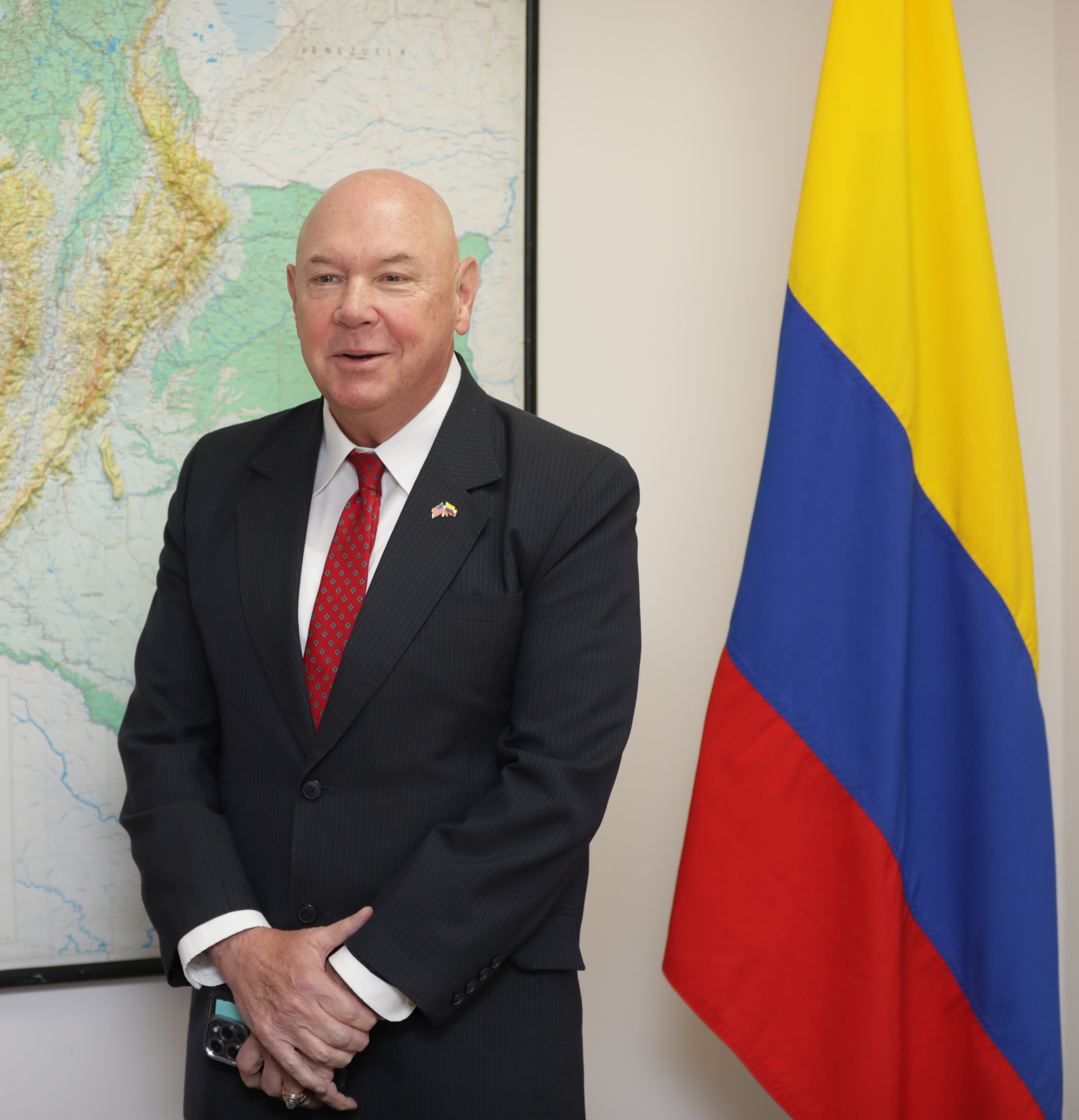
John McNamara believes the bilateral relationship must be pragmatic. Photo: MAURICIO MORENO
I wouldn't like to talk about things that aren't my responsibility or that haven't happened. But I can speak in terms of what Colombia's trade relationship with the United States is like alongside its relationship with communist China. When I look at the overview of the two bilateral relations, it's worth mentioning that ours is a binational trade of added value and shared democratic values. This is an important aspect that not all countries, including that Asian country, have. We have two systems of government: Colombia and the United States are part of the free world, where the people rule through their votes and elect their representatives. And there are those countries, China in particular, that have the idea that the people work for the government, or perhaps for a single party, or for a single boss. That's not how we see it; those are not our values. Furthermore, as I've already said, thanks to the FTA, trade has expanded significantly. The United States is the largest source of foreign investment in Colombia, much more, 37 times more, than Chinese investment. And I don't know if that's clearly understood. Furthermore, the United States is the largest importer of all Colombian agricultural products, absorbing 40 percent of exports. China buys barely 2 percent. And we have a balanced bilateral trade relationship: the United States seeks opportunities to grow together with other countries. In the case of the other country, that relationship is not balanced at all. According to DANE (National Economic Development Agency), Colombia had a trade deficit of more than $12 billion with China: 10 times the deficit with the United States. And what we buy from Colombia is much more than just raw materials: there is added value in the process, and all sectors of its economy are connected to our trade. Furthermore, there is a level of mutual trust that is very important: we are countries that respect the law, contracts, and formal agreements. Obviously, it is the decision of your government and the honorable Colombian people how they want to manage their economic relations, with whom they want to grow together, or with whom they risk losing a lot. There are many examples of wrongdoing, accusations of corruption and mismanagement. Ecuador is facing an electricity crisis largely due to the inability of a hydroelectric plant (built by a Chinese company) to generate the promised electricity (...) With us, Colombia has an honest partner, because our companies follow their laws and ours. We even have a law that allows for the prosecution of companies that violate our laws abroad. With us, they have a reliable partner, high-quality companies that are accountable for their work. And we are Americans: there is much to gain from having good commercial and military relations with our neighbors. We are neighbors and we are proud of relations that, God and the Virgin Mary willing, should last 200 more years. I am confident that it is possible and that we have a partner to work with and with the capacity to resolve problems through diplomatic means. And this is for the well-being of two peoples united by democratic values, by a shared history of good, bad, and difficult times. When Colombia was suffering that wave of violence, bandits everywhere, who was with you? We, with Plan Colombia, invested more than $10 billion in the Armed Forces and the country's institutions, a country that to this day is one of the best examples of institutionality and respect for its Constitution in Latin America.
Andrés Mompotes and John Torres
General Director of EL TIEMPO and Director of PAÍS
eltiempo





